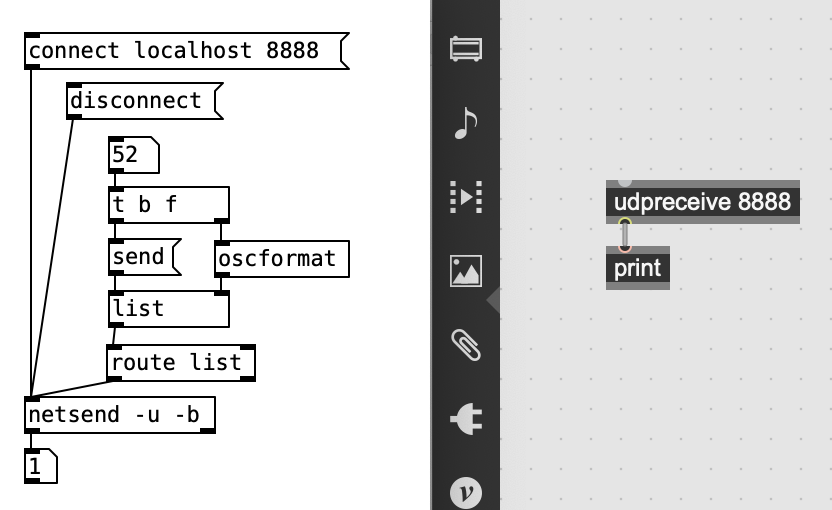netreceive-external wanted, Downloadsite down
Hi,
i´searcing for netreceive external for max msp.
The Link doesn´t wor. Could anyone send me this external?
Thanks very much,
hgh
why not use a built in solution like udpreceive, jit.netreceive, or mxj netreceive ? that thing seems a bit outdated.
because i wants to receive from pure Data an some other aplications.
especially for networcing with pure Data netreceive works great!
So i need netreceive external...
You don't need netreceive to communicate with PD. Any UDP receiver vichung suggested will work. Besides his suggestions, there is also the $Adam library (usefull for TCP).
I´ve tried a lot... I dont work... Or I´ve made some mistakes.
I´ve seen a Youtubetutorial PD MaxMSP communication: this way is very simple and it works...
If someone has Tips wich objects are working, i´ll try it. ;)
ok
i don't know about the exact object you're looking for, it seems deprecated... you should maybe try other solutions like the sadam library and use the sadam.netReceive external, then decode the output using atoi fromsymbol regexp fromsymbol
it's boring, but it kind of works, maybe someone will have that object but...
@Patrick : as unsettling as it sounds, udpreceive doesn't work... i get this message using netsend :
udpreceive: OSC Bad message name string: DataAfterAlignedString: Unreasonably long string
Dropping entire message.
If i use CNMAT format and OpenSoundControl i get a DataAfterAlignedString: Unreasonably long string
though i get an osc packet (it prints FullPacket 8 639655792); OpenSoundControl doesn't seem to be able to decode this.
edit : and here's what printit says
printit: received MESSAGE "FullPacket" (0x238a56dc, s_thing 0x0) with 2 argument(s):
printit: LONG 8
printit: LONG 599960744
printit: It looks like an OSC packet
but the size is only 8 bytes, so I won't try to print it.
there's that maybe ? http://www.nullmedium.de/dev/netsend~/
Thanks, but i need netreceive and without ~ ;)
No, i´ll try sadam-lib...
I guess sadam lib is your best bet at the moment !
Ok, now i´m receiving Data from PD over udp in Max:
I wants to send numers and I´m receiving with sadam udp.receiver (the postet patch obove) Data.
But i send float: 100 and receive: some pairs of numbers:
Sending: "100" Receiving with Sadam this:
"120 120 32 49 48 48 59 10"
sending 200 for example, i´ll receive exactly:
"120 120 32 50 48 48 59 10"
How to format this, that i receive my "200" ???
Thanks very much!!!
now, with unpacking it works fine:
I´m able to send values from MaxMSP with [netsend 1]to Max and receive this with Samdam: The patch postest in this topic above.
do you go through [itoa] object ?
edit : ninja'd - seems alright now - if i understood well.
Yes,
handling [itoa] object was the solution. Now, it works!
Thank You very much!!!
hi,
just to clarify :
Puredata [netsend] and [netreceive] objects are using FUDI protocol over tcp or udp (just as Pd itself internally to communicate between GUI and core).
Those are different from [tcpsend], [tcpreceive], [udpsend] or [udpreceive] (from mrpeach or iemnet lib) with which you can send or receive raw byte data from/in puredata.
Please see [1] for FUDI reference.
In Max, [udpreceive] and [udpsend] are using OSC at least since Max 5.0.8.
So I guess, it would have been more clear to call them [oscreceive] and [oscsend].
Or even [oscoverudpsend] [oscoverudpreceive], but I agree this is a long name for something that is simple to use.
So to replace the missing [netreceive] in Max, you have to use (since I can't find any alternative) the Sadam library.
And as it has been already said, put a [itoa] after it to convert the raw byte to human-readable messages.
But please note that I can't make it work in TCP, which is quite a pity since Pd is using it unless you tell it to use UDP.

